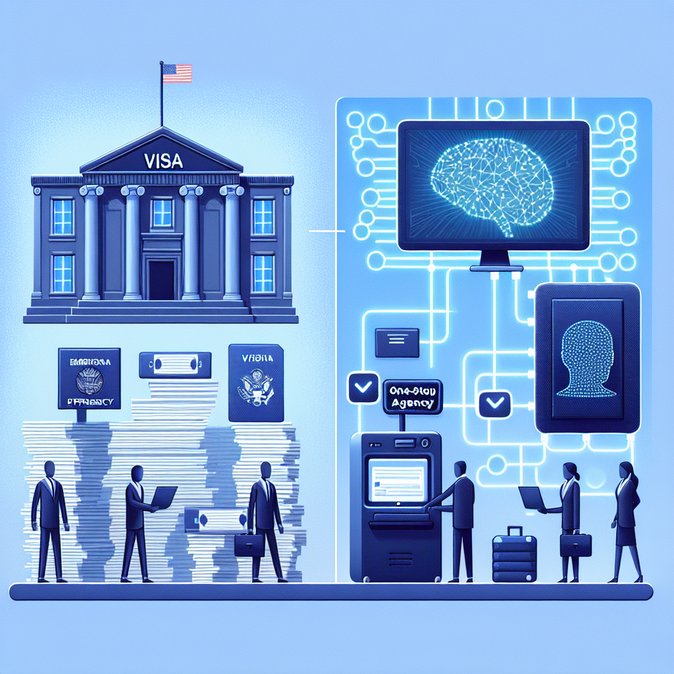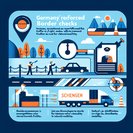
Berlin has placed digital reform of its migration system at the heart of a wider push to cut bureaucracy. Speaking after the 5 November 2025 cabinet meeting, government spokesman Staatssekretär Kornelius confirmed that Germany will “deploy artificial intelligence in visa procedures and migration administration to make processes more efficient, faster and better.”
The move responds to chronic backlogs at German missions abroad, where business-visa appointments for skilled workers and executives can still take months. Under the new plan, AI-based triage will pre-screen applications, verify data against multiple security databases, and flag anomalies for human review. Officials say pilot testing in Manila and Bengaluru cut average processing time for ICT-permit applicants from 54 to 21 days, while error rates fell slightly. Data-privacy safeguards will mirror those used in Germany’s e-identity program, and the Federal Commissioner for Data Protection will audit the algorithms twice yearly.
![Germany’s Cabinet Embraces AI-Driven Visa Processing and Launches ‘Work-and-Stay’ Agency]()
Coupled with AI, the cabinet adopted a blueprint for a new “Work-and-Stay-Agentur” – a single digital portal that will bundle labour-market checks, residence permits, social-security registration and relocation advice. Modeled on Denmark’s International Citizen Service, the platform will allow employers to upload contracts, proof of qualifications and housing in one step; applicants will receive a fully issued residence card upon arrival rather than after multiple local-office visits. A physical help-desk is slated to open at Frankfurt airport in mid-2026 for last-minute document issues.
Business groups including the Federation of German Industries (BDI) welcomed the announcements, calling them “a breakthrough for talent mobility.” Global mobility managers note that Germany’s Skilled Immigration Act 2.0 already eased salary thresholds for the EU Blue Card this year; AI screening and the one-stop agency could make Germany one of the fastest G7 destinations for work permits by 2026.
For companies, the practical takeaway is to prepare internal HR systems for API integration with the new portal and to update data-privacy notices for employees. Immigration advisers expect detailed regulations in early 2026 and recommend starting document-digitisation projects now. The political sub-text is also clear: with a tight labour market and polls showing concern about irregular migration, Berlin wants to signal that it can be both welcoming to talent and tough on bureaucracy.
The move responds to chronic backlogs at German missions abroad, where business-visa appointments for skilled workers and executives can still take months. Under the new plan, AI-based triage will pre-screen applications, verify data against multiple security databases, and flag anomalies for human review. Officials say pilot testing in Manila and Bengaluru cut average processing time for ICT-permit applicants from 54 to 21 days, while error rates fell slightly. Data-privacy safeguards will mirror those used in Germany’s e-identity program, and the Federal Commissioner for Data Protection will audit the algorithms twice yearly.

Coupled with AI, the cabinet adopted a blueprint for a new “Work-and-Stay-Agentur” – a single digital portal that will bundle labour-market checks, residence permits, social-security registration and relocation advice. Modeled on Denmark’s International Citizen Service, the platform will allow employers to upload contracts, proof of qualifications and housing in one step; applicants will receive a fully issued residence card upon arrival rather than after multiple local-office visits. A physical help-desk is slated to open at Frankfurt airport in mid-2026 for last-minute document issues.
Business groups including the Federation of German Industries (BDI) welcomed the announcements, calling them “a breakthrough for talent mobility.” Global mobility managers note that Germany’s Skilled Immigration Act 2.0 already eased salary thresholds for the EU Blue Card this year; AI screening and the one-stop agency could make Germany one of the fastest G7 destinations for work permits by 2026.
For companies, the practical takeaway is to prepare internal HR systems for API integration with the new portal and to update data-privacy notices for employees. Immigration advisers expect detailed regulations in early 2026 and recommend starting document-digitisation projects now. The political sub-text is also clear: with a tight labour market and polls showing concern about irregular migration, Berlin wants to signal that it can be both welcoming to talent and tough on bureaucracy.











